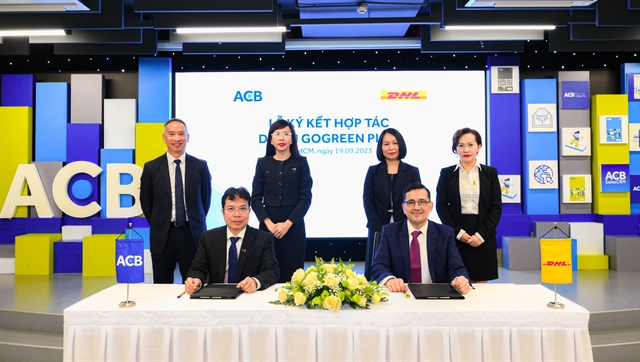ACB and DHL Express cooperate to reduce carbon emissions in international express delivery
ACB has become the first bank in Việt Nam that has signed a contract to use DHL's service to reduce carbon emissions for their international delivery shipments.

Asia Commercial Joint Stock Bank (ACB) has become the first bank in Việt Nam that has signed a contract to use DHL's GoGreen Plus service to reduce carbon emissions for their international delivery shipments through the use of sustainable aviation fuel (SAF).
By applying GoGreen Plus Service, the bank estimates it can reduce up to 14 tonnes of CO2 emissions a year.
The emission reduction process is certified annually by a third independent company – Société Générale de Surveillance (SGS). In addition, an additional carbon footprint report will be updated monthly that will detail ACB's total emissions in partnership with DHL Express.
Ngô Tấn Long, Deputy General Director of ACB, said ACB offers top-notch international payment services and partners with DHL to provide eco-friendly options that promote sustainable development.
In 2022, ACB recorded that 93 per cent of staff were eager to work with the bank to implement environmental protection initiatives in the ESG (environment, society, corporate governance) group. Consequently, 215 tonnes of paper were saved and recycled, 32 tonnes of plastic were substituted with eco-friendly materials, and about 181 tonnes of CO2 were preserved through the use of recycled carpet.
GoGreen Plus was launched this year by DHL Express, global express delivery group to further reduce CO2 emissions, including using sustainable aviation fuel (SAF)
SAF (Sustainable Aviation Fuel) is created using various non-traditional materials such as waste, CO2 synthesis, grain, used frying oil, and even trash. Unlike gasoline or petroleum-based fuels, SAF is not a typical jet fuel. However, it is currently the sole option for long-haul flights and has the potential to become a widely accepted solution in the near future.
According to DHL, the group is committed to achieving net zero emissions by 2050 and is investing US$8.26 billion in carbon emission reduction initiatives by 2030. — VNS





